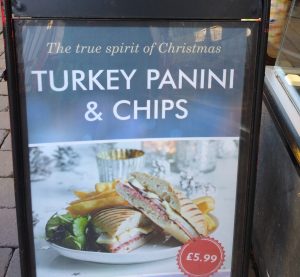 This would be a fine place to spend eternity.
This would be a fine place to spend eternity.
From the lichened drystone wall where I sat the land rolled away to the horizon, a series of gradual grassy undulations punctuated with clumps of shrubs and trees. In the distance the peat browns and heather purples of the moor spread their muted patchwork; within the tiny churchyard itself, oaks, ashes and other trees were stretching (more…)
 You know when you’re driving along in the rain—the kind that your wipers can’t really cope with, and they go into a sort of frantic ineffectual fastwipe which is slightly silly, somehow, in the way that a powerwalk is—and you see walkers trudging along the verge, heads bowed, sheathed almost entirely in rustling nylon, their huge packs, also nylon-sheathed, rearing behind them like a doom they can’t shake; and you think casually, in passing, ‘Poor bastards’? Well. On day three of the pilgrimage, those poor bastards were us. (more…)
You know when you’re driving along in the rain—the kind that your wipers can’t really cope with, and they go into a sort of frantic ineffectual fastwipe which is slightly silly, somehow, in the way that a powerwalk is—and you see walkers trudging along the verge, heads bowed, sheathed almost entirely in rustling nylon, their huge packs, also nylon-sheathed, rearing behind them like a doom they can’t shake; and you think casually, in passing, ‘Poor bastards’? Well. On day three of the pilgrimage, those poor bastards were us. (more…)
 ‘Think it possible that you may be mistaken’. This is the final sentence of number 17 of the Quaker Advices and queries (a key text in Quakerism). Is there anyone, anywhere, any time (pass the Martini!) who couldn’t benefit from sitting with that idea for a while?
‘Think it possible that you may be mistaken’. This is the final sentence of number 17 of the Quaker Advices and queries (a key text in Quakerism). Is there anyone, anywhere, any time (pass the Martini!) who couldn’t benefit from sitting with that idea for a while?
Here I was, arriving from Oxford at Didcot Parkway on the way to a Quaker Enquirers’ course at the splendidly-named Charney Manor. I was emotionally exhausted after the morning’s encounter with lost youth, and physically exhausted after having a run (flatter than Kendal, but muddier also), wandering round town for miles, and lugging a large backpack whose hipbelt, I discovered too late, was no longer operational. And friends, there’s a lot of train stuff at Didcot Parkway. I mean, a LOT. What with that, and (more…)
You can read this poem here.
Like Betjeman’s ‘In a Bath Teashop’ (which you can also read here), MacNeice’s ‘Meeting point’ captures an experience both ordinary (in the sense of common) and extra-ordinary: the exalted, exalting human experience of being “in love”. Though very different in tone, these poems both emphasise the time-out-of-time quality of the state of “in love-ness”. It is a privileged state in so many ways, of which ‘Meeting point’ reminds us; but, in the repeated refrain ‘time was away and somewhere else’, MacNeice emphasises how being in love frees us —for however long or short a time—from the usual human condition of being, and knowing ourselves to be, unavoidably subject to time. Indeed, by the end of the poem, the repeated refrain ‘time was away and somewhere else’ has become ‘time was away and she was here’. This underlines how the presence of the beloved obliterates and as it were replaces time.
I love so much about this poem. Aside from the refrain, however, what stays with me always is the line ‘God or whatever means the Good’. Particularly in a time when religion seems to be so divisive (though perhaps ’twas ever thus), this is, for me anyway, such a simple, beautiful and therefore useful way to refer to something/someone. It acknowledges the existence of different concepts and understandings—’whatever means the Good’—at the same time as it invites us to see what is common to them all.
And that penultimate stanza is so neatly circular. The word-for-word repetition in the first and fifth lines, and the way the stanza’s argument seamlessly moves us from statement to restatement, seems somehow to enact the process of “proving” something, which the stanza describes. ‘[T]he body’s peace’ manifests ‘what the heart has understood’, which itself verifies ‘God or whatever means the Good’; which whole process is a cause for praise to ‘God or whatever means the Good’. The process works forwards, backwards and probably sideways for all I can tell. Brilliant. Just brilliant.
Do have a look at the Betjeman, too. Some of the diction feels of its time, and may grate on 21st century sensibilities; but this poem, too, exalts the state of exaltation in a way which those of us lucky (?) enough to fall in love cannot but recognise.
 So, this has to be one of the weirdest things I’ve seen this Christmas. “The true spirit of Christmas: Turkey panini and chips”. I mean, what? Who wrote that, and why? And why are they still working in advertising??
So, this has to be one of the weirdest things I’ve seen this Christmas. “The true spirit of Christmas: Turkey panini and chips”. I mean, what? Who wrote that, and why? And why are they still working in advertising??
There’s something about how adrift things have got, here (unless of course this is so achingly post- post- modern and ironic that it should come with paracetamol) which inclines me either to laugh, or weep. I’ve decided to laugh, and (more…)
 This would be a fine place to spend eternity.
This would be a fine place to spend eternity. You know when you’re driving along in the rain—the kind that your wipers can’t really cope with, and they go into a sort of frantic ineffectual fastwipe which is slightly silly, somehow, in the way that a powerwalk is—and you see walkers trudging along the verge, heads bowed, sheathed almost entirely in rustling nylon, their huge packs, also nylon-sheathed, rearing behind them like a doom they can’t shake; and you think casually, in passing, ‘Poor bastards’? Well. On day three of the pilgrimage, those poor bastards were us.
You know when you’re driving along in the rain—the kind that your wipers can’t really cope with, and they go into a sort of frantic ineffectual fastwipe which is slightly silly, somehow, in the way that a powerwalk is—and you see walkers trudging along the verge, heads bowed, sheathed almost entirely in rustling nylon, their huge packs, also nylon-sheathed, rearing behind them like a doom they can’t shake; and you think casually, in passing, ‘Poor bastards’? Well. On day three of the pilgrimage, those poor bastards were us.  ‘Think it possible that you may be mistaken’. This is the final sentence of number 17 of the Quaker Advices and queries (a key text in Quakerism). Is there anyone, anywhere, any time (pass the Martini!) who couldn’t benefit from sitting with that idea for a while?
‘Think it possible that you may be mistaken’. This is the final sentence of number 17 of the Quaker Advices and queries (a key text in Quakerism). Is there anyone, anywhere, any time (pass the Martini!) who couldn’t benefit from sitting with that idea for a while? So, this has to be one of the weirdest things I’ve seen this Christmas. “The true spirit of Christmas: Turkey panini and chips”. I mean, what? Who wrote that, and why? And why are they still working in advertising??
So, this has to be one of the weirdest things I’ve seen this Christmas. “The true spirit of Christmas: Turkey panini and chips”. I mean, what? Who wrote that, and why? And why are they still working in advertising??